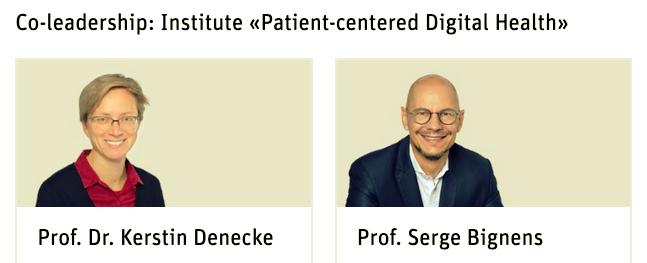Bern University of Applied Sciences is bolstering its position in the field of medical informatics by founding an institute that focuses on patient-centered digital health. Its mission is to develop solutions that positively impact the Swiss healthcare system. Patients will be supported, for example, in self-management and their communication with service providers.
The institute is headed up by Kerstin Denecke and Serge Bignens, previously Head of the Institute for Medical Informatics at Bern University of Applied Sciences. The unique feature of the new Institute is the strong focus it places on the patient. Patient-centered means designing and developing solutions specifically to support patients. One way this is done is by collecting data from Patient-Reported Outcome Measures (PROMs), which are made available to the various actors in a treatment chain and in anonymised form for quality monitoring, always respecting patient consent. At the same time, patients are also involved in the development. “It is about working with patients to develop solutions that can benefit them in their health management,” says Denecke. New technologies and digital solutions will enable patients and doctors to make more informed decisions. This enhances the quality of healthcare.
“It’s about working with patients to develop solutions that can benefit them in their health management.”
Protection of patient data of utmost importance
Denecke and Bignens are looking forward to developing solutions in cooperation with stakeholders from industry, research and healthcare. Their main concern is that secure digital solutions for health management find their way into everyday practice. As Serge Bignens explains: “With the increasing use of health data and its collection in digital health solutions, the protection of patient data is of utmost importance.” Thus the Institute places an emphasis on developing secure technologies that provide for self-determination in terms of data provision.
“With the increasing use of health data and its collection in digital health solutions, the protection of patient data is of utmost importance.”
The first projects are already underway
Research projects with a strong patient-centered focus are already underway. In the Approches project, a mobile application for patient relatives was developed; in another project, OpenPROMS, a pilot implementation for the collection of patient-reported outcomes is being carried out on behalf of the Federal Quality Commission. The SERO project, funded by Health Promotion Switzerland, focuses on people at risk of suicide and their relatives. Stakeholders were involved throughout the development process and their needs taken into account. The MIDATA health database is used for secure data storage. More projects will follow in the coming months.
About the Institute management

Kerstin Denecke
Kerstin Denecke studied computer science with a minor in medicine at the Technical University of Braunschweig and completed her doctorate there on the topic of information extraction from medical texts. Since 2015, Denecke has been a lecturer in medical informatics at BFH, where she has been Co-Head of the Health Technologies Centre since 2020. She has authored more than 150 scientific articles on Natural Language Processing, Conversational User Interfaces, Sentiment Analysis and Participatory Health Informatics, and has a broad, international network of contacts with researchers in these fields. She leads the Participatory Health Informatics working group in the International Medical Informatics Association.
Serge Bignens
After studying engineering at EPFL and Carnegie Mellon University, Serge Bignens built up the health division at a major IT company, then worked on the cantonal eHealth strategy for the canton of Vaud. Bignens has been a lecturer at BFH since 2014 and has also been a head of institute since 2016. Bignens is also president of the MIDATA cooperative and is on the board of the Swiss Society for Medical Informatics, the Forum for Integrated Care, the Swiss Cancer Screening Association and the CH++ organisation.
Source: Bern University of Applied Sciences, Nov 1, 2023

